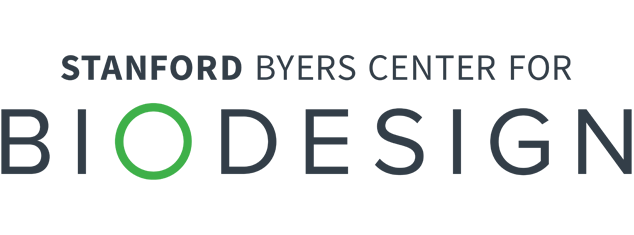The Stanford Byers Center for Biodesign collaborates with other entities within and outside the university to administer translational grant programs that benefit Stanford's rich community of innovators and researchers. These competitive award programs take full advantage of the funding, resources, and expertise uniquely available in the Silicon Valley ecosystem. Over many years, we have developed an exceptional track record in enabling selected projects to “translate” from the university into commercial development.
Each program provides seed funding. In some cases, the funding is the first support for the project. In other instances, these funds help bridge the gap between initial research funding and commercial investments or licenses. Importantly, all recipients also receive intensive, hands-on mentorship and practical guidance to more efficiently and effectively advance their technologies toward patient care.
Learn more about these programs and how they help empower our trainees.
Spectrum Medtech Grants
Biodesign contact: Linda Lucian
Project types: Translational research involving medical devices and mobile technologies used for (1) therapeutic applications and (2) device-based patient-specific (or POC) diagnostic applications
Funding opportunity: Up to $50,000 for one year
Stanford Biodesign manages health technology grants within the broader National Institute of Health-funded Spectrum program. Projects chosen for these grants must have the objective of translating discoveries into novel health technologies that address important unmet health needs. Stanford faculty with principal investigator (PI) eligibility and Clinical Educator faculty with an approved PI waiver from any department are invited to apply for these awards. Along with the PI, the teams may also include students, postdocs, and visiting scientists.
For each project, the intellectual property of the core technology must be owned by Stanford (not under an option or license to any entity). Inventors can work with the Office of Technology Licensing (OTL) to take this IP out of the university if/when appropriate.
Stanford-Coulter Translational Research Grants
Biodesign contact: Linda Lucian
Project types: Translational research involving devices, diagnostics, and therapeutics
Funding opportunity: Up to $100,000 for one year
Funded by the Wallace H. Coulter Foundation and managed by the Stanford Byers Center for Biodesign in partnership with Stanford Bioengineering, the Coulter program supports multidisciplinary teams of biomedical engineers and clinical scientists performing translational research on unmet healthcare needs. Teams must include both a principle investigator from a clinical department in the Stanford University School of Medicine and from the Bioengineering department.
For each project, the intellectual property of the core technology must be owned by Stanford (not under an option or license to any entity). Inventors can work with the Office of Technology Licensing (OTL) to take this IP out of the university if/when appropriate.
Neuroscience: Translate Grants
Biodesign contact: Linda Lucian
Project types: Translational research involving devices, diagnostic procedures, software, and pharmaceutical therapies
Funding opportunity: Up to $100,000 for one year
Created by the Wu Tsai Neurosciences Institute at Stanford and managed by Stanford Biodesign, the Neuroscience: Translate grant program uses the Coulter Program blueprint to encourage teams of researchers to address unmet needs in any area of neuroscience or brain health. The program provides both funding and mentorship. Teams must include at least two co-principal investigators from different fields, both of whom must be members or faculty affiliates of the Wu Tsai Institute. At least one faculty member must be a clinician.
For each project, the intellectual property of the core technology must be owned by Stanford (not under an option or license to any entity). Inventors can work with the Office of Technology Licensing (OTL) to take this IP out of the university if/when appropriate.
UCSF-Stanford Pediatric Device Accelerator
Biodesign contact: James Wall
Project types: Promising pediatric device ideas/projects led by innovators willing to work with the UCSF-Stanford Pediatric Device Consortium (PDC) to develop the idea into a marketable project; devices must meet the FDA definition of a medical device and be intended for use in the pediatric population (birth to 21)
Funding opportunity: up to $100,000 per project
The UCSF-Stanford PDC was founded in 2018 to improve the health, safety, and quality of life of pediatric patients by accelerating the development and availability of technologies developed specifically for kids. Funded by the US Food and Drug Administration, the UCSF-Stanford Pediatric Device Accelerator provides funding, customized product development and commercialization advising, and other support from experienced innovators and industry leaders to help drive promising pediatric device ideas towards market availability. In addition to funding, the award involves mentoring, advising, and subsequent tracking of project progress, including regular progress and spending updates. The program is restricted to US-based applicants.
Biodesign Summer Extension
Biodesign contact: Linda Lucian
Project types: Further development of health technology projects originated in the fellowship or innovation course
Funding opportunity: Funding for fellowship individually determined up to $60,000; funding for class projects $10,000
Each May, the Stanford Biodesign Innovation Fellows and students from the graduate-level Biodesign Innovation course may apply for grants to pursue their projects through the summer. Recipients use this time, funding, and the resources available through Stanford Biodesign to further de-risk their technologies, develop business plans, and line up additional funding to take their projects to the next level.
For each project, the intellectual property of the core technology must be owned by Stanford (not under an option or license to any entity). Inventors can work with the Office of Technology Licensing (OTL) to take this IP out of the university if/when appropriate. (Note that Stanford OTL policies may be different for undergraduate students.)
Biodesign NEXT
Biodesign contact: Linda Lucian
Project types: Further development of health technology projects originated in select Biodesign courses
Funding opportunity: $1,000 for one quarter of funding, $2,500 for a second quarter
Students in a subset of other Stanford Biodesign courses may apply for 1 or 2 quarters of support through the Biodesign NEXT extension funding program. In addition to providing high-performing teams with resources and funding to advance their technologies, this extended learning program helps prepare aspiring innovators for careers in health technology innovation through a learn-by-doing experience.
For each project, the intellectual property of the core technology must be owned by Stanford (not under an option or license to any entity). Inventors can work with the Office of Technology Licensing (OTL) to take this IP out of the university if/when appropriate. (Note that Stanford OTL policies may be different for undergraduate students.)
Biodesign Faculty Fellowship Extension
Biodesign contact: Linda Lucian
Project types: Further development of health technology projects originated in the Biodesign Faculty Fellowship program
Funding opportunity: $10,000 of funding for June 1 - September 30
Each May, the Biodesign Faculty Fellows compete for two extension awards. The awards include both seed funding and mentor support with the goal of improving the translational prospects of the selected projects. During the extension period, recipients work to develop further proof-of-concept and de-risk their technology in order to strengthen their position when they apply for additional grant funding.
Robert Howard Next Step Award
Interested in having a leading global design firm help you with your first prototype? PA Consulting selects a current Stanford Biodesign team or individual to receive complimentary design and engineering consulting in order to help advance a health technology project toward patient care. Learn more about the Robert Howard Next Step Award here.
Please contact Linda Lucian with questions regarding these funding opportunities.
Grant Program Leaders
 Gordon Saul Executive Director
Gordon Saul Executive Director Linda Lucian Translation Projects Manager
Linda Lucian Translation Projects Manager
